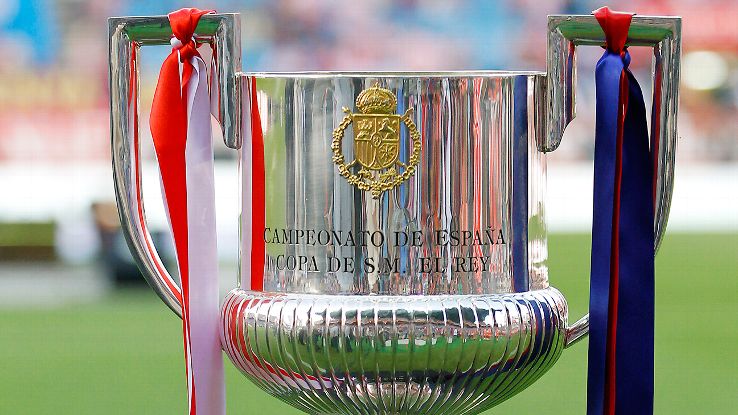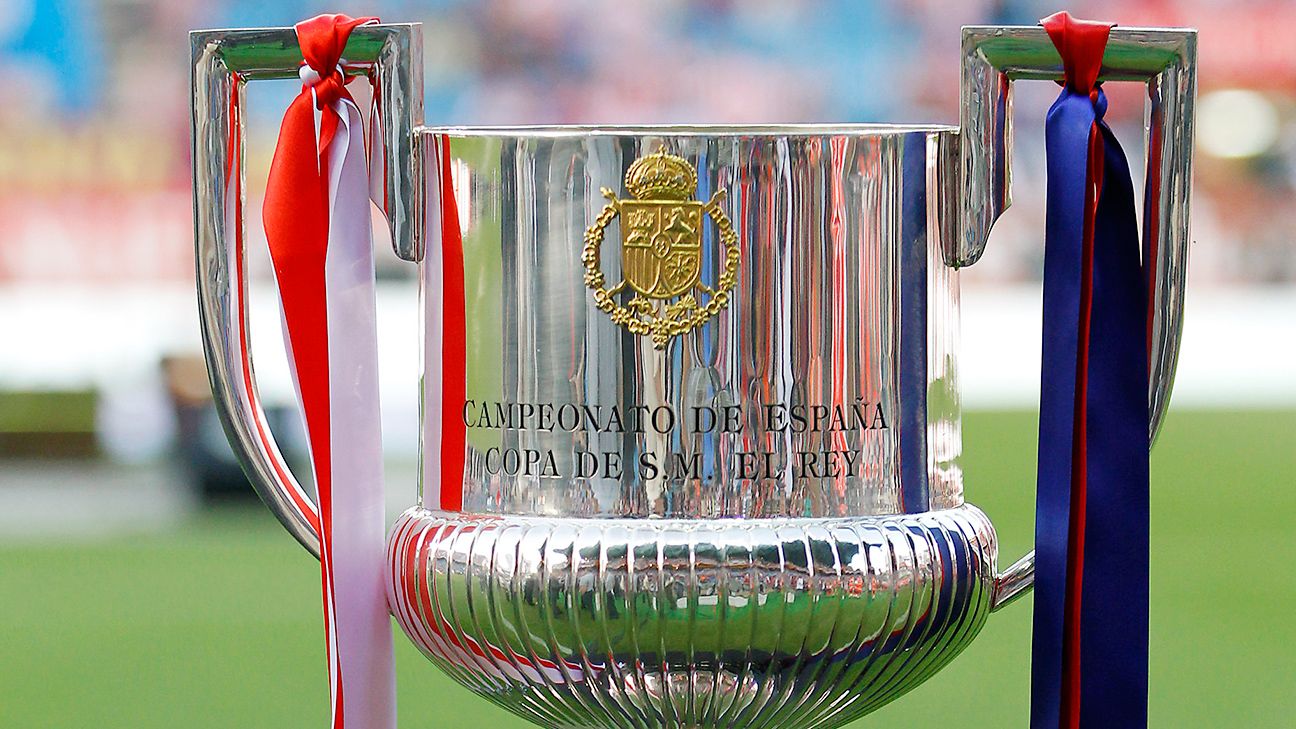Products You May Like


“Goal in Las Gaunas!”
If there’s a single line that expresses the way football takes over the whole country, touching every town and club, not just Madrid and Barcelona, a cry of equality, it is this: a phrase that conjures images of small, muddy grounds across Spain, often repeated and invariably said with a touch of nostalgia.
It’s a simple moment of radio commentary that wormed its way into the collective conscious with (now-defunct) CD Logrones’ promotion to the first division in 1987, drawing everyone in to what was happening in the tiny Rioja region, but most probably don’t know that. It just became one of those phrases people say, evoking imperfect pitches and something purer somehow.
It is a phrase from the league that somehow fits the Copa del Rey even better — this year, especially.
This week, Spain’s teams competing in Europe join the round of 32, which means the holders, Valencia, travelling to Las Gaunas to play UD Logrones, the team founded in CD Logrones’ place, hoping not to join their hosts’ name to Guadix and Novelda, tiny teams whose names alone are enough to make fans shiver. They’re a pair of Second Division B (Spain’s third tier of professional football) sides that knocked out Los Che (in Novelda’s case because they played too many foreigners, admittedly) in the years when they reached the European Cup final and won the league.
Those kinds of upsets, results that make a cup competition, became rarer: a fixed draw, two-legged games, ever-increasing financial imbalance and huge squads brought an inevitability to matches between clubs big and small, almost rendering them meaningless. That meant emptier stadiums, too. But the Copa del Rey, long flawed and often a little unloved, has been revived this year — or that, at least, is the intention of the Spanish Federation.
It’s still far from perfect — in the week they claimed was the cup’s time in the sun, Real Madrid, Barcelona, Valencia and Atletico were in Saudi Arabia playing the Supecopa and overshadowing everything — but reverting to a single game, played at the home ground of the team from the lower division and opening the competition to more sides all the way down well beyond Segunda B gives smaller teams a better chance of an upset and the competition value. This is real value, not just monetary. New stories are told, furnishing football culture with new memories that will one day be old ones.
Espanyol play Real Sociedad (2:55 p.m. ET Wednesday; stream live on ESPN+), who invited little Becerril to Anoeta to watch them play, all expenses paid, after they defeated them 8-0 in the previous round. That’s not just the team but the whole town, all 754 residents.
Eibar go away to Badajoz (2:55 p.m. ET Thursday; stream live on ESPN+). They got through against even smaller Cacereno only thanks to an own goal with the very last touch of the game. Afterward, they invited heartbroken Alberto Delgado, the man who scored it, to watch them play. Badalona knocked out Getafe. Next they get a shot at Granada (2:55 p.m. ET Wednesday; stream live on ESPN+).
Cultural Leonesa have a habit of this David vs. Goliath atmosphere, helped by the draw-fixing that means teams in Europe face Segunda B sides. They played Madrid in 2017 and Barcelona in 2018 and next face Atletico (2:55 p.m. ET Thursday; stream live on ESPN+). Osasuna go to Recreativo de Huelva (12:55 p.m. ET Tuesday; stream live on ESPN+), the country’s oldest club, an institution that has seen better times and should be protected, another victim of business without a soul.
Elche have asked Athletic Club to let Andoni Lopez play against them, even though he belongs to them (12:55 p.m. ET Wednesday; stream live on ESPN+). Barcelona are heading to Ibiza (12:55 p.m. ET Wednesday; stream live on ESPN+), where there were overnight queues for tickets. They’re hot property: two hooded men broke into the club’s offices at Can Misses and stole 40 tickets.
Not that any of those games express that idea as well as Real Madrid’s trip to Las Pistas to face Unionistas de Salamanca (2:55 p.m. ET Wednesday; stream live on ESPN+). Nothing can, not least because of the fact that they’re playing at the fabled Las Pistas.
Unionistas were founded by fans when the western city of Salamanca’s traditional club, UD Salamanca, went into administration and folded in 2012. In their 90-year history, they spent 12 years in the first division and 24 in the second. But they were gone. Their supporters, who had come together to try to save the club in the first place, built a new team to follow, one they were determined to keep out of the hands of the kinds of investors and speculators they’d seen run their club out of business and ruin so many others.
Unionistas have no singular owner; instead, their 2,800 members are the owners, all with a say in the running of the club, and they had no intention of replacing UD Salamanca. They sought only to honour them. The badge even says “in memory of UDS” on it, and in the 23rd minute of every game, they sing the old UDS anthem.
They play in Las Pistas, a municipal pitch alongside the Helmantico, where the old Salamanca played. Before every match, fans gather flags and banners from a small storeroom and prepare the place, festooning it for the football. At the end of every match, they put it all back again. The team they watch — the team they own, the team they run, the team that is theirs — is pretty good, too. Three promotions from amateur, regional football where they started have taken them to the Segunda B and, now, to the Copa del Rey round of 32 to face Real Madrid.

But they’re not doing it in Madrid. After the draw was made and having been told there would be neither time nor permission to erect temporary seating that could accommodate this cup tie, it was suggested that Unionistas play in the Helmantico or somewhere else nearby, somewhere bigger. It was even suggested that they go to the Bernabeu.
But the Helmantico is occupied by Salamanca CF UDS, the latest guise of a club that had been Salamanca Athletic, CD CF Salmantino and CF Salmantino UDS, a club founded by a Mexican businessman who bought the stadium and the remnants of the original club. In other words, Unionistas’ rivals and, the UD fans believe, usurpers of the memory and patrimony of UDS, representing an ownership model they want to leave behind. They also believe there was something greater than money, a statement to make, a position to maintain, belief to back.
So they fought for the right to play at Las Pistas instead. And, again, they won.
“We could have made a half-million Euros playing at the Bernabéu,” midfielder Cristian Padilla said. “But the club preferred to be faithful to their principles.”
At a club such as Unionistas, that would have been a huge amount of money: more than their entire annual budget. Gareth Bale will be there on Wednesday. He makes €37 million per year; the average salary at Unionistas is less than €2,000 per month. The entire budget is €400,000; Madrid’s is 2,000 times that. But there is something bigger at stake.
“This club is different,” Padilla said. “Here, the people are in charge. This is futbol popular. The players don’t earn big salaries, but they win in other terms — human ones.”
Underlining that, on Tuesday morning, Unionistas will announce that they are joining Common Goal. True solidarity begins from below; they’re an example of how it can work. Padilla, a friend of Juan Mata’s and already committed to donating 1% of his salary, put them in touch and kicked off the conversations. “I liked the idea of the club joining a movement with the same ideas: a social project, something for the people, for the fans. I’m delighted. And I’ll try to get my teammates to join [on an individual level], too.”
It isn’t an exaggeration to suggest that there might never have been a game such as this, with this much symbolism in the Copa del Rey this season. “This is the kind of game that the old Salamanca would have played, in professional football, the kind of game they still should [be around to be] playing,” Padilla said. “Instead, there are about 3,000 of us, and it’s a party for the whole town. The fans earned that — quite literally. They’re the people who founded us, who are to ‘blame’ for this. They’re the ones who brought us here.”
“Goal in Las Gaunas” was quite something, a lasting legacy. A goal in Las Pistas might mean even more.
